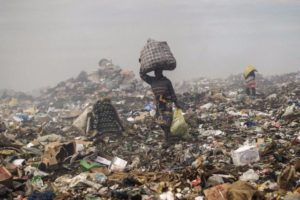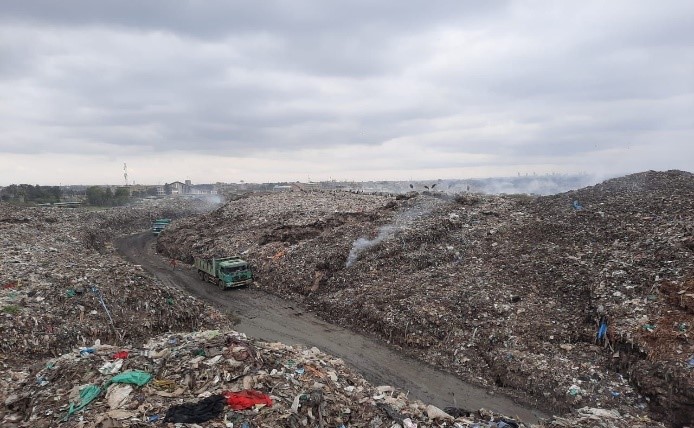LANDFILL IN GHANA – Growing up in Ghana, waste was either incinerated individually or landfilled or tossed into the environment which ends up clogging the drainage system. Even when collected from the residential areas with the assurance that it will be dealt with, no one knows where it ends up.
This, and many more concerns were the main reason that motivated me to formalize my training through a Master of Environmental Management with a specific focus on policy, waste planning, urban planning, and energy.
Popularly known us the “garbage man” among my peers is what got me asking what our policy concerning waste management systems is in Ghana? Is it centered on landfilling or recovering waste resources?
A critical look at the waste management hierarchy, which is the reduce, reuse, recycle, waste to energy, landfills, isn’t just a catchy phrase but the order which Ghanaians are supposed to be doing things when it comes to management of waste. Landfilling is the least preferable.
Most of the waste generated in Ghana ends up in the landfills. Why is the Government of Ghana creating more landfills and neglecting the other “Rs”, reduce, reuse, and recycle? Ghana’s policy priority should focus on waste reduction.
The Government of Ghana revised the Sanitation Policy in 2010 to address the challenges of the old policy published in 1999. The new policy lays the foundation for developing a pragmatic approach and framework to identify and harness resources for value-for-money services to all.
Intuitively, if waste is classified as a resource in Ghana, why are we landfilling the materials generated? Indeed, Ghana has failed to capture the economic aspect of that waste and experiencing the poorly environmental outcome. Landfilling the waste generated completely undermines the Government’s policy to recover resources and ignores the “3Rs”: – reduce, reuse, and recycle.
The rate at which the population is increasing in Ghana, coupled with the rush for land for development in the bigger cities and an increase in waste generated from the residents got me thinking that landfilling takes a lot of space and a time will quickly come when Ghana will run out of space. The earlier we resort to other alternatives, the better for the economy.

Let us also take into consideration that a poorly designed landfill site could create leachate which in the long run could contaminate the water table. A good example of this danger is the Kpone landfills site, which is in the Greater Accra Region. Who is monitoring the surface and ground water for leachate and other volatile organic compound? Who has the data generated from the sampling? How much is this costing the Greater Accra Region?
From a sustainable waste management point of view, landfilling does not exist in isolation. In the case of diversion and recovery of resources, landfilling is bad for the environment. Based on the revised policy in 2010, which focuses on capturing the waste Ghanaians generate, we can say attention should not be landfilling. Landfilling sends the wrong signals to the public to generate more waste rather than minimizing.
So, how can Ghanaians divert these materials from ending up in the landfills? Do we have the infrastructure like bins to separate the waste? Who will be collecting the waste materials and where will they go? What type of materials are we looking to recover? How much will this cost each region to manage its waste? Who will be educating the public?
In my previous article “COVID 19 And The Need To Change Ghana’s Waste Management Systems” I did mention that “waste is part of our culture, but doing it right and putting it where it belongs is a habit”. Clearly, we all have a role to play to make waste not an out of sight kind of thing, as all over the world efforts is been put in place to champion zero waste mantra. Kudos to our president, Nana Akuffo Addo, for cutting sod for Integrated Recycling And Compost Plant And waste Waste Water Treatment Plant in Ghana published by Modern Ghana on August 19th 2020.
Hopefully, that will not be long on carrots but short on effective stick. This will help divert more materials from ending up in the landfills, recover resources as our policy states, and free up space in the landfills and address the methane emission which is a potent green house gas emission to catalyze climate change.
In conclusion, you and I feel the impact when the light goes off and water isn’t flowing but with the case for waste management it has always been an out of sight from the general public until we start smelling the stench, breathing the toxic air engulfing us. The long-term effect is costly and deadly.
By Environmentalist Nana Adjei
A passionate environmentalist with experience in waste planning, energy, recycling, and composting. Currently the Supervisor for Solid Waste Department and Compost Manager for the City of Brockville, where he successfully planned Household Hazardous waste and over 600 residents came to drop off their hazardous waste. Member of the Waste Wiki Faculty of Environmental Studies research team. Follow him on Instagram @ambientics_consulting.


